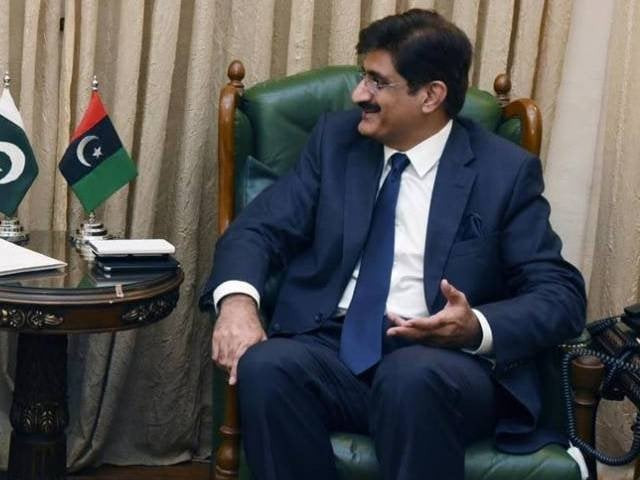CM approves grant for displaced families of Thar
Rs950m have been approved, a stipend of Rs10,000 per family will be given monthly

CM Murad Ali Shah. PHOTO: PPI
The CM took this decision while presiding over a meeting at the CM house to review water and rehabilitation schemes for Tharparkar. The meeting was attended by Energy Minister Imtiaz Shaikh, Planning and Development Chairperson Mohammad Waseem, Principal Secretary to CM Sajid Jamal Abro, Irrigation Secretary Jamal Shah, Sindh Engro Coal Mining Company (SECMC) Chairperson Khursheed Jamali and others.
Shah said that 1,200 families have been displaced due to development of Thar Coal Block-II, therefore, "we have decided to support them [affected families] financially."
He said they will be provided "with a well-designed and well-constructed house in a township with all basic facilities such as a kitchen, washrooms, corridor, veranda and courtyard, and more than two jobs to each affected family."
He directed the Thar Foundation to invest the grant of Rs950m and start giving a Rs10,000 monthly stipend to each affected family of Thar Coal Block-II. Shaikh informed the chief minister that 60 houses have already been completed for resettlement of the affected families and work on the remaining houses was in progress.
The CM also decided that the royalty to be generated from the coal project, which has been estimated at Rs2.5 billion, will be spent on the people of region. Thar will be transformed into one of the most prosperous cities of the world he said, and added that a similar social uplift scheme, as the one designed for the affectees of block-II, will be developed for other coals blocks as well if the people are affected by the excavation. He further added that the Thar coal filed was spread over 9000km2 and has been divided in 12 blocks.
The other important project discussed in the meeting was Thar Coal Water Works project which is being built to supply water to coal filed Block-II which would be used for power generation.
Shah said that the scheme was worth Rs9.9b and the effluent from sugar mills would destroy the left bank outfall drain (LBOD) water to be used for power generation. He constituted a committee under the energy minister to meet sugar mill management of different districts who release their effluent in the LBOD and direct them to release treated water. "I want them [sugar mills] to establish their own treatment plants and release treated water into the LBOD," he said directing Shaikh to report to him within 15 days.
The CM said that if treated waste water was released into LBOD, government expenditures would come down from Rs9.9b to only Rs4b. He added that he will be visiting Thar now and then to monitor the progress of uplift schemes in Thar.
River Indus Channelisation
The CM directed the Planning and Development (P&D) and Irrigation Departments to conduct feasibility of new Sukkur Barrage and channelization of River Indus between Guddu and Sukkur barrages. The decision was taken at a special meeting presided over by the CM on Saturday.
The meeting was attended by MNA Khursheed Shah, water expert Idress Rajput and provincial ministers, Imtiaz Shaikh, Syed Nasir Shah, Special Assistant to CM on Irrigation Ashfaq Memon, former MPA Nasrullah Baloch, P&D Chairman Mohammad Waseem and chief engineers of the irrigation department.
SC questions PPP-led govt over situation in Thar
The chief minister said that the concept to channelise River Indus between the two barrages, Guddu and Sukkur, would help reduce water losses, control water logging and salinity and protect the area from breaches.
The distance between Guddu and Sukkur was 180 kilometres and the width of the river bed was 12-20km. The construction of new bunds (embankments) would not only reduce the width of river bed but create more than 5,00,000 acres of new land for cultivation. The concrete channel would also reduce water losses which have been estimated between 5-8%.
CJP orders urgent action to tackle malnutrition in Thar
The chief minister also talked about the construction of new Sukkur barrage for which a feasibility report was required to assess the actual alignment of the bridge and the expenditures to be incurred and the time required to complete the construction. "We will also discuss, study and decide under which mode the barrage may be constructed," he said.
Published in The Express Tribune, December 9th, 2018.



















COMMENTS
Comments are moderated and generally will be posted if they are on-topic and not abusive.
For more information, please see our Comments FAQ